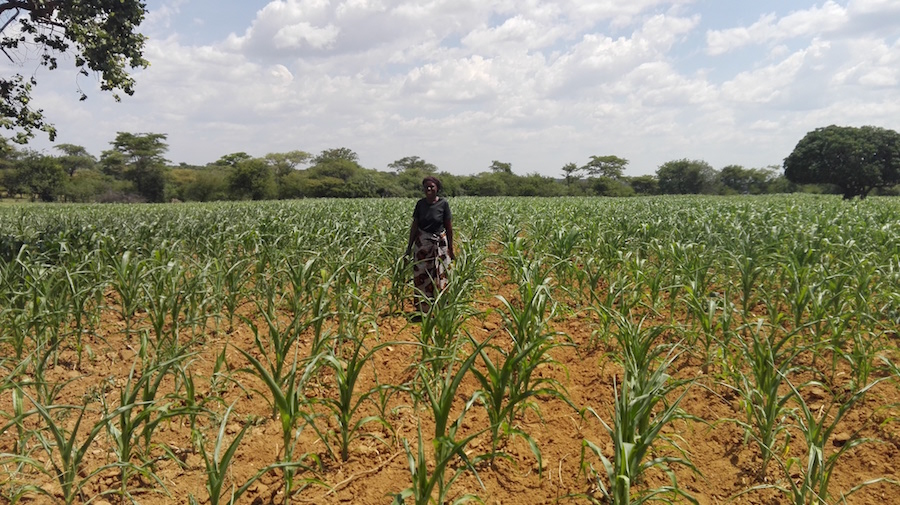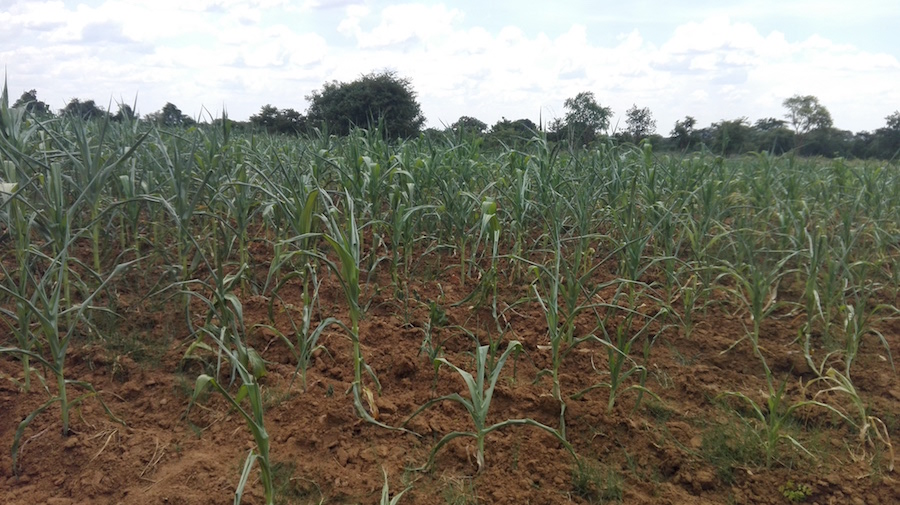
By Friday Phiri
PEMBA, Zambia (PAMACC News) – Grace Moonga harvested 115 by 50 Kg bags of maize last season. And it was enough for family food consumption and sale for income generation to support her second year University student son.
But she is afraid that this year’s farming season is turning out negative—a prolonged dry spell affecting her 3 hectare maize field.
“Just look at this crop,” laments Moonga, pointing at her severely wilted crop. “It has been 22 days since it last rained here. This is a serious disaster for a widow like me whose only source of income is farming, I don’t even know what will become of my son at the University.”
Since 2007 when her husband died, Moonga has been supporting her six children through smallholder farming. So far, her first born son has completed his teaching course, while the university student was only in primary five when his father died.
However, dependency on rainfall is increasingly becoming a risky business for smallholder farmers as erratic rainfall punctuated with prolonged dry spells has become the norm rather than an exception. For instance, the 2015/16 farming season was characterized by the El Nino induced drought.
While 2016/17 season restored some hope with normal to above normal rainfall, the 2017/18 season is turning out

negative—a prolonged dry spell which according to the Zambia Meteorological Department, has caused substantial moisture deficits and an increased likelihood for adverse crop production.
According to Zambia Meteorological department, the prolonged dry spell being experienced over Lusaka, Southern, Western and Southern parts of Central and Eastern Provinces have been largely due to atmospheric systems – the consecutive occurrence of deep low-pressure systems and tropical cyclones over the Mozambique channel and the Indian ocean.
Unfortunately, the forecast up to March 2018 remains negative as abnormal dryness has strengthened and expanded, placing additional moisture stress on crops, especially at critical stages of growth.
Nevertheless, good as this forecast maybe, it largely remains generic and scientific for smallholder farmers to easily interpret. It is for this reason that climate change development actors have been advocating for improved climate information and other climate resilient services such as insurance for smallholder farmers.
In Zambia, one such institution working in this area is the World Food Programme (WFP). Under its R4—Rural Resilience Initiative, WFP has installed automated and manual weather stations in selected project areas to facilitate improved meteorological information for smallholder farmers.
Mosco Hamalambo is a trained rain gauge attendant at Sibajene village, one of the 20 manual rain gauge stations dotted around Pemba district. He believes the weather stations have improved farmers’ knowledge especially on the time to plant.
“With this facility, we now have readily available information when we should plant our crops,” Hamalambo told PAMACC News. “Even as we are experiencing this dry spell, we have the information on how much rainfall we have received and how poorly distributed it has been.”
Hamalambosays such information is helpful for comparison with satellite data on which weather index insurance is based—another component of the R4 project where farmers are enrolled for a possible pay-out if they do not receive required amounts of rainfall in a set and agreed window of the farming season.
In terms of amounts of rainfall, 400 mm of rainfall received in the area is enough for optimum production of maize according to Stanley Ndhlovu, WFP Zambia R4 Coordinator.
However, “the challenge has been distribution, it has been very erratic.”It is however not yet clear whether the index would trigger for a pay-out. Close to 4000 farmers are enrolled on the R4 project weather index insurance scheme.
In the meantime, Grace Moonga is hoping and praying for some heavy downpour as she still believes something could be salvaged from her wilted crop—thanks to Conservation Agriculture (CA) which she practices. Under CA, minimum tillage and mulching practices help to retain moisture for crops to withstand prolonged dry spells.
Considering the elongated dry spell experienced, Moonga knows that what could be salvaged would still not be enough, hence placing her last hope in weather insurance. “From what we were taught about how this insurance works, I am hopeful that we might receive a pay-out this year,” she says enthusiastically.











